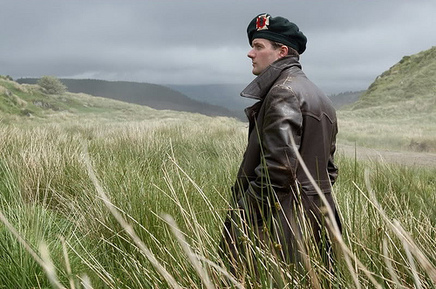The 20th century story of Ireland gains a new cinematic facet in Ken Loach's The Wind That Shakes the Barley. Eschewing the Troubles of In the Name of the Father or '71 for a period decades earlier, Loach frames the struggle against English occupation within a fraternal bond. Set during the War of Independence and the Civil War that immediately followed, Loach captures the allure of the sunk cost fallacy in a high-stakes setting.
Despite long odds, the English eventually sue for peace, but celebrations do not last long. The treaty allows Ireland greater autonomy, but the country remains an English dominion. This half-result drives a wedge between the brothers, as Damian wants all that he's done to truly guarantee a future while Teddy is simply ready for peace. Class divisions also rear their head. The brothers come from a landowning family, and Damian is haunted by his father callously making tenants destitute or homeless. He insists that a political revolution must also become an economic one, lest the English banks and interests retain their hold on Irish lives. Teddy's place in the new Irish army puts him directly against his brother's desire to continue to fight against the now-collaborating government, and despite the withdrawal of the English, the battle rages on.
The presence of the class issue makes The Wind That Shakes the Barley more complex than the typical Troubles films. These often are straightforward thrillers or morality plays, complete with a Manichean struggle at their center. Paul Laverty's script contains plenty of fist-clenching scenes of brutality visited upon the weak, but it resists easy characterizations on the Irish side. The chasm between Damian and Teddy is well-communicated, with each making cogent points. Damian is clear-eyed and the most clever debater in the film, but he has allowed the perfect to become the enemy of the good. Needing to make his sacrifices and the sacrifices of the dead worth it, he charges on even after his initial enemy has been defeated. Teddy gets less screen-time, but it's apparent how exhausted years of warfare has made him, and how painful it is for him to have to fight against his countrymen. While they frame the War for Independence as a good, Loach and Laverty don't leave the viewer with a historical warm-fuzzy, and instead continue into a much grayer period.
Murphy and Delaney lead the strong cast of Irish actors. They have a believable brotherly relationship, with the older Teddy as the brawn and the younger Damian as the brains. Decades-in-the-making dynamics play out between them, with Damian beginning to doubt his faith in his brother and Teddy struggling to see his brother as anything other than a child. Murphy fills Damian with the fire a young revolutionary needs, and Delaney gives Teddy the plaintive charisma necessary for a voice of caution and tentative steps. Liam Cunningham plays a key role as Dan, Damian's main source of moral support on the front lines. When people turn to Dan for his opinion, it's easy to see why, as Cunningham is a strong and noble presence throughout. Orla Fitzgerald plays Sinead, a woman as stuck in her situation as Damian, whom she's in a romantic relationship with. Both are drawn to each other out of their shared, hopeful outlook, but both share fatal flaws of being too committed to their people. Sinead mirrors Damian's arc closely, and both actors convey the frustration of thwarted dreams.
The Wind That Shakes the Barley is an intelligent microcosm of revolutionary history, playing out grand ideas and forces on a small and resonant scale. The Irish Civil War doesn't have a lengthy film recounting, so Loach's film admirably contributes to a clearer picture of the period. History education doubling as enthralling entertainment is an easy thing to recommend. B+

 RSS Feed
RSS Feed